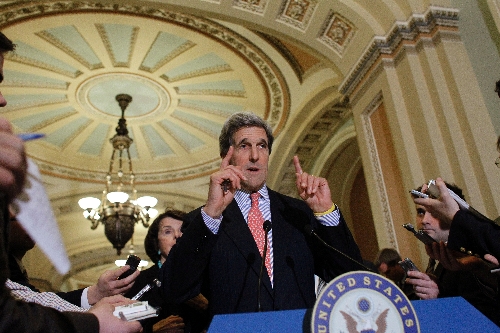Backers seek Republican votes
WASHINGTON -- President Barack Obama tried to sway reluctant Republican senators on Monday to back a new arms control treaty with Russia as GOP aversion to giving a politically damaged president another victory intruded on his national security agenda.
The White House and senior Democrats expressed confidence that they had the votes for the accord that was signed by Obama and Russian President Dmitry Medvedev in April. The two countries negotiated the New START pact to cap nuclear weapons and restart weapons inspections .
Proponents edged closer to getting the two-thirds vote they needed for ratification as Republican Sen. Scott Brown of Massachusetts announced he would support the treaty. In recent days, Brown had received a call from Secretary of State Hillary Rodham Clinton. Republican Sen. Johnny Isakson of Georgia, who also heard from Clinton, sent the strongest signal yet that he would support ratification.
Treaty backers also were heartened as several Republicans broke ranks, voting against three GOP amendments that would have effectively killed the treaty. With the help of eight Republicans, Democrats beat back an amendment to increase the number of weapons inspectors on a 64-33 vote. They also rejected a measure to change the accord and increase the number of deployed launchers on a 64-33 vote. An effort to change the treaty to include tactical nuclear weapons also failed, 62-35.
Obama lobbied senators by phone as he pressed to complete the treaty before January when Republicans increase their numbers by five in the Senate, casting the accord's fate in doubt. In addition to Clinton, Vice President Joe Biden called lawmakers to push for ratification.
Adm. Mike Mullen, chairman of the Joint Chiefs of Staff, sent a letter to lawmakers read during the closed meeting expressing support for the accord. "This treaty enhances our ability to do that which we in the military have been charged to do: Protect and defend the citizens of the United States. I am confident in its success as I am in its safeguards. The sooner it is ratified, the better," Mullen wrote.
Politics coursed through the debate on Monday as Republicans were still peeved by Senate Majority Leader Harry Reid's decision to interrupt the six days of treaty consideration for votes on the repeal of the ban on openly gay members serving in the military and an unsuccessful immigration measure, legislation they considered a sop to the Democratic Party's liberal base.
"No senator should be forced to make decisions like this so we can tick off another item on someone's political check list before the end of the year," Senate Minority Leader Mitch McConnell said.
Obama suffered a self-described "shellacking" in the Nov. 2 midterm elections as his party lost control of the House and suffered an erosion in its Senate majority. Yet he has scored two major political wins in Congress' postelection session -- overwhelming bipartisan passage of the tax deal he cut with Republicans and repeal of the "don't ask, don't tell " policy.
Senior Democrats pushed toward a possible decisive vote today to cut off debate and set the stage for a final vote later in the week. Republicans and Democrats were discussing amendments to the accompanying resolution -- not the treaty -- that would address GOP concerns about missile defense and build support for the agreement.
Democrats expect to get 57 votes from their caucus, with Sen. Ron Wyden, D-Ore., absent due to cancer surgery on Monday. Five Republican senators -- Richard Lugar of Indiana, Olympia Snowe and Susan Collins of Maine, George Voinovich of Ohio and Brown -- have said they back the treaty while four others -- Robert Bennett of Utah, Judd Gregg of New Hampshire, Tennessee's Bob Corker and Isakson -- said they were leaning toward approval.

















